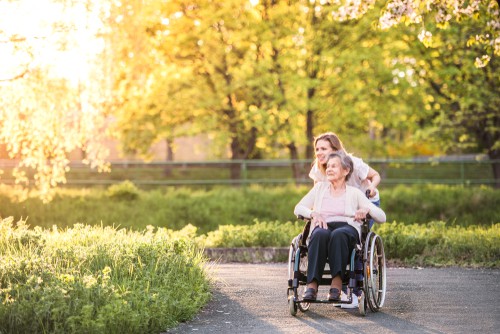
Choosing To Die At Home
The art of living well and dying well are one.
Epicurus
End of life choice
A good death
Limited Time
Comfort and familiarity
Having family and loved ones around you
Geoff’s Story – A Case Study
The end of someone’s life is a very precious and delicate time. If we knew that we are facing a life-limiting illness it would be natural that we would want our final days to be dignified, to be comfortable and to have loved ones by our side and remain at home for as long as possible. The majority of people who are terminally ill would prefer to die at home, where they feel comfortable and safe.
Despite this 75% of people spend their final days in hospitals, palliative care units or nursing home facilities. But you can make the choice where and how you want to live in the limited time you have left.
End of life choice

In-home palliative care has many benefits which is why it is the best option for those who are terminally ill. The care that you can receive can help to minimise the grief and distress associated with death and dying for the individual as well as for their family, friends and carers.[1] Being at home helps maintain the emotional wellbeing of the person and quality of life. This is mostly due to the familiar environment where lifelong memories were created and where you are comfortable, surrounded by family and friends you know and love and including beloved animal companions.
In September 2014, the Grattan Institute released a report entitled Dying Well [ 2] about how, where and with whom we die, said :
In the last year of life, many experience a disconnected, confusing and distressing array of services, interventions and relationships with health professionals. Many do not get enough palliative care.
It went on to say
A good death gives people dignity, choice and support to address their physical, personal, social and spiritual needs.
What is a good death?
- To know when death is coming, and to understand what can be expected
- To be able to retain control of what happens
- To be afforded dignity and privacy
- To have control over pain relief and other symptom control
- To have choice and control over where death occurs (at home or elsewhere)
- To have access to information and expertise of whatever kind is necessary
- To have access to any spiritual or emotional support required
- To have access to hospice care in any location, not only in hospital
- To have control over who is present and who shares the end
- To be able to issue advance directives which ensure wishes are respected
- To have time to say goodbye, and control over other aspects of timing
- To be able to leave when it is time to go, and not to have life prolonged pointlessly
Limited time
Dying at home allows you to spend precious time with your loved ones who may visit anytime and are not restricted to hospital visiting hours. With palliative care in your own home, you are offered ample opportunity to maximise your quality of life in many different ways. Your at home care is tailored to you and your needs and your round the clock care ensures that you always get the care and assistance that you need at any time. The carers and nurses are consistent and familiar to you as opposed to a different nurse every shift, every day if you are in a hospital or nursing home.
Comfort and familiarity
A home death is much more peaceful than the busy, sterile, clinical environment of a hospital setting. At home you are surrounded by your personal effects, including all the things that you treasure be they pictures, art, books or music that you can continue to enjoy whenever you choose and it is a place you are familiar with. You will still have access to expert advice from your GP, palliative care Specialist and palliative care team so as to respond to pain and symptom control if required.
Having family and loved ones around you
Your family and loved ones will also have some say in your care. They know you better than anyone and this in turn helps give them peace of mind knowing that they can provide care for you in this difficult time. Home-based end of life care also provides respite and support to family and loved ones who are involved in care. Overall, it gives you a sense of control. This is something that we often lose when restricted to a hospital setting. It is so importance that those who are dying feel and know they are in control and that they are valued and their wishes are taken into account. They are the most important person at this time.

Geoff’s Story – A Case Study
One particular case was a client of ours, a 80 year old man called Geoff. He was diagnosed with pulmonary fibrosis and was given 2 weeks to live. He was told to admit himself to a palliative care unit and await his death. Geoff requested a consult with us. We discussed his fears and his wishes. Knowing that within our team, Marella Stigler has the credentials as a Specialist in palliative care and would not only be there to look after him but also to have overall supervision of his care and ensuring that the whole team would know exactly how to care for him. Geoff knew we had the knowledge, skill and experience to help him in his journey.Geoff was an economist and an author living in North Sydney. A highly intelligent man who was one of the driving forces behind extending opening hours for shopping centres on Thursday nights and on the weekend. Living in NSW he had no family available to him to assist him during this time. Geoff married late in life to the love of his life. Unfortunately she died many years ago and they had no children.
When Geoff realised his life was coming to an end he knew he had many decisions to make. He was very concerned as he had a lot to do such as clearing his apartment and garage and finishing his project, a book he was writing.
Geoff wished to die in peace in his home. He was an extremely private and independent man. He was intolerant to noise therefore did not want to die in a noisy hospital environment. He enjoyed specific foods and knew that this was yet another thing that hospitals could not cater for.
The hospital environment for many end of life terminal illness care patients is overwhelming as it was for Geoff. Every day and every shift brings a different nurse, a different face and lacked consistency in his care. He had to abide by the structures of the hospital routine as to when to shower and when he could eat. Being a pedantic man he found it exhausting having to continually explain how he wanted his food prepared and how he wanted to attend to his hygiene.
Geoff enlisted our services and with a small group of our carers and nurses we were able to keep Geoff comfortable in his own home. Our care workers knew how to prepare his food the way he liked, attend to his personal hygiene the way he liked, assist him with shopping and even go for drives to his favourite places. Geoff thrived at home in his familiar surroundings, his collection of books and a lifetime of memorabilia and photos of his beloved wife with views of his wife’s roses out on the balcony which the care workers tended for him. Here he was at peace.
Geoff was initially given 2 weeks but with excellent care provided by Home Sweet Home Care his life was extended by 10 months which assisted Geoff in clearing his house and garage and writing his book. Everyone including his doctors were amazed at how well he was.
As his disease progressed he became more dependent on the nurses and care staff from HSHC. Geoff had 24 hour care but was still happy to stay in his own home. Towards the end Geoff’s elderly sister came over from Perth to spend quality time with him. Geoff died peacefully in his bed in the comfort of his own home with our nurses he built a rapport with and trusted during his journey. Marella was by Geoff’s side just as she had promised at their first meeting. We couldn’t prevent the outcome but were able to support him and make a difference through his difficult journey to the end. Working together with his very supportive GP and the palliative care community team to ensure his death was pain free and peaceful.
We are here to help in any way that we can.
Make the choice for yourself and your loved one and contact HSHC today for a chat about end of life care or email us at: info@homesweethomecare.com.au.
Additional materials:
[1] https://grattan.edu.au/report/dying-well/
[2] National Consensus statement: Essential elements for safe and high-quality end-of-life care published in 2015 by the Australian Commission on Safety and Quality in Health Care : https://www.safetyandquality.gov.au/publications-and-resources/resource-library/national-consensus-statement-essential-elements-safe-and-high-quality-end-life-care